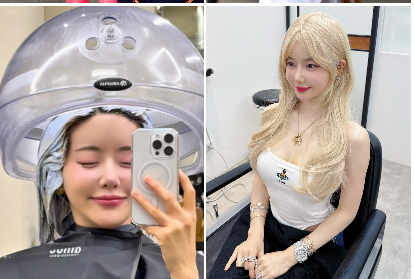DJ Soda’s image has always been at the intersection of aesthetics and artistry, and many fans have speculated about how she has changed over time. Hwang So-hee, better known by her stage name DJ Soda, had a very different look before the spotlight made her more visible on stages throughout Asia and beyond. She was softer, more subtle, and didn’t wear the striking makeup that would later become a staple of her brand.
Looking at older pictures, especially from her early 2013 DJ sets, makes it very evident how her face kept its natural roundness and how few cosmetic enhancements she used. She underwent subtle changes as she gained international recognition, including a sharper jawline, more defined eyelids, and noticeably fuller lips. Although these claims are conjectural and have not been verified by DJ Soda herself, they have stoked a continuing discussion concerning pressure to be beautiful in the fashion and music industries.
| Field | Detail |
|---|---|
| Real Name | Hwang So-hee |
| Stage Name | DJ Soda |
| Birthdate | April 7, 1988 |
| Nationality | South Korean |
| Profession | DJ, Model |
| Music Genre | Electronica, Hip-Hop |
| Active Years | 2013–present |
| Former Label | Highline Entertainment (Warner Music Group) |
| Key Festival Gigs | S2O Songkran, Ultra Music Festival, World Club Dome |
| Official Bio | Wikipedia – DJ Soda |
Her painful experience with hair loss from excessive bleaching has sparked a renewed discussion about her appearance in recent days. That moment, which was visibly devastating and emotionally raw, provided a unique look behind the carefully manicured public persona she has built. In a heartfelt update, she revealed the damage, admitting that she sobbed for days after discovering she had lost large portions of her hair. Fans were deeply moved by this moment, not only by the obvious change but also by the vulnerability it revealed.
Her experience was compared to people getting ready for surgery, where expectations, trust, and anticipation frequently clash with unexpected outcomes. The image of DJ Soda gazing into the mirror while clutching at the hair that used to confidently crown her head reflects the feelings of a person who has just woken up from a procedure that has had unanticipated results.

She transcended her status as a performance icon by disclosing her trauma. She served as a reminder that even people who are praised for their perfection have deeply human moments. Authenticity, even when painfully displayed, creates stronger bonds than curated perfection, as demonstrated by the outpouring of supportive messages from her fans on her platforms.
DJ Soda is not the only one experiencing this phenomenon. Figures like CL, HyunA, and even Western pop artists like Cardi B and Doja Cat have been under similar scrutiny. Despite being praised for their self-assurance and daring styles, these performers have all been the subject of public criticism due to changes in their physical appearance. The distinction between identity and enhancement is becoming increasingly hazy in a time when cosmetic procedures are both sensationalized and normalized.
The unvarnished honesty with which DJ Soda has handled her journey is what makes it so poignant. There was no spin, no press release. Just a weak woman confessing that she was broken. She received even more support because of her level of candor, which is remarkably uncommon among international performers. She presented her healing process as a fresh start based on restoration and care rather than a return to her previous beauty.
DJ Soda used her platform to start a conversation that went well beyond hair and surgery. It raised concerns about how the entertainment industry frequently sacrifices health for appearance, how entertainers are pressured to go to extremes to preserve their reputation, and how people in the spotlight are supposed to remain unfazed even when their reputation is literally collapsing.
Accountability in the salon industry was also subtly brought to light by her case. Even though stylists are trusted to make changes, badly done treatments can have long-lasting, sometimes irreversible effects. Her experience is now included in a larger movement for regulated standards in beauty services, especially for public figures whose careers are impacted by their appearance.
Even during this recuperation period, DJ Soda has kept up her gig booking and music production through strategic partnerships and a tenacious work ethic. Her fortitude in openly addressing shame, recuperation, and professional demands has been incredibly successful in changing the way that artists view vulnerability.
Interestingly, she chose not to have the problem fixed by corrective surgery. She adopted hats, wigs, and alternative styling options instead, putting more emphasis on creativity than disguise. This strategy, which is especially novel in a field that is fixated on perfection, strengthens her impact as a performer and as a cultural icon who redefines strength.
Her generosity, which includes a kind donation of ₩10 million to Uljin wildfire victims, also reveals a side of her that is rarely highlighted. DJ Soda’s use of her platform goes far beyond aesthetics; she is socially conscious, dedicated, and compassionate.
It is anticipated that she will continue to impact music and social norms in the years to come. It’s evident that her legacy will be determined by how she handled her most trying times rather than just by how she looks, as younger DJs and aspiring models look to her for inspiration.
